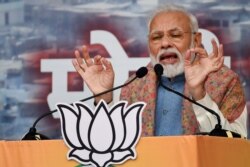On July 22, India’s Income Tax Department raided 32 offices of Dainik Bhaskar Group, one of India’s biggest newspaper and broadcast operators, as part of an investigation into alleged tax evasion.
Officials searched “the residential and office premises” of the group in the states of Madhya Pradesh, Maharashtra, Gujarat, Delhi and Rajasthan. News reports said that in Bhopal, journalists were prevented from working and immediately reporting the raids, and that laptops and phones were confiscated.
Dainik Bhaskar labeled the raid an attack on press freedom and retaliation for the organization's critical coverage of the Modi government’s handling of the pandemic.
The flagship newspaper Dainik Bhaskar has been widely applauded for its reporting of the coronavirus pandemic and government failings, including graphic coverage of dead COVID-19 victims floating in the Ganges. Dainik Bhaskar has also exposed undercounting of pandemic deaths by the state and central governments. The daily claims to have 46 editions in 11 states and the largest circulation in India.
Reacting to the raids, the Editors Guild of India said “government agencies are being used as a coercive tool to suppress free and independent journalism.” It cited recent news reports naming India among the countries that may have used Israeli spy software known as Pegasus to hack the phones of journalists, opposition members and human rights activists.
After Sanket Upadhyay, the executive editor of NDTV, tweeted assertions by Dainik Bhaskar’s national editor that tax authorities had tried to plant and pre-approve news stories, the tax agency issued this denial:
“Certain allegations have appeared in some sections of media that ITDept officials were suggesting changes in stories &taking editorial decisions during their search on offices of a certain publication. These allegations are absolutely false &are categorically denied by ITDept.”
This statement is misleading, given contradictory news reports and the current Indian government’s extensive history of pressuring critical news outlets and journalists.
Although India has a robust media environment, it ranks 142nd out of 180 countries in the world Press Freedom Index compiled by Paris-based Reporters Without Borders. Under Prime Minister Narenda Modi, India has become “one of the most dangerous countries for journalists trying to do their job properly,” RSF said in its most recent review of the country:
“Ever since the general elections in the spring of 2019, won overwhelmingly by Prime Minister Narendra Modi's Bharatiya Janata Party, pressure has increased on the media to toe the Hindu nationalist government’s line. Indians who espouse Hindutva, the ideology that gave rise to radical right-wing Hindu nationalism, are trying to purge all manifestations of “anti-national” thought from the public debate.
"The coordinated hate campaigns waged on social networks against journalists who dare to speak or write about subjects that annoy Hindutva followers are terrifying and include calls for the journalists concerned to be murdered. The campaigns are particularly violent when the targets are women."
Arvind Kejriwal, the chief minister of Delhi and Modi’s political opponent, condemned the latest raids, which also hit TV channel Bharat Samachar.
"Income tax raids conducted on Dainik Bhaskar and Bharat Samachar are an attempt to scare the media,” he told the Hindustan Times. “Their message is clear – those who speak against the Bharatiya Janata Party (BJP) will not be spared. This kind of thinking is very dangerous. Everyone should raise their voice against it.
Upadhyay tweeted a video in conversation with Dainik Bhaskar’s national editor, Om Gaur, who asserted that the raid was a result of the newspaper’s critical coverage of the Modi government. Gaur said tax officials were making recommendations on prospective stories and asked the staff to run every article by them before publishing.
In June, Gaur authored an article published by The New York Times titled, "The Ganges is Returning the Dead. It Does Not Lie." The article described how the paper, sold mainly in small towns and villages, dispatched 30 reporters and to walk the holy river's banks:
"Our reporters counted 2,000 bodies on May 12 and 13 alone as they traveled 700 miles along the river. The bodies weren't only floating in it; on some days, 65 or 70 were washing up on its shores. Yet by our calculations, based on official data, the state authorities claim that just 7,826 people died from Covid-19 from April 1 to May 13 ..."
"After more reporting, we estimated that between mid-April and mid-May some 4,000 corpses had been placed in shallow pits by the river along a stretch of less than one mile."
Devendra Bhatnagar, the Gujarat editor of Divya Bhaskar, a sister newspaper of Dainik Bhaskar that also was raided, told the Indian Express about prolonged intimidation tactics used by the state and central governments to silence the newspaper.
“First, they tried building pressure through different manners,” he said. “For the past two-and-a-half months, both the Central and state governments have stopped advertising (in the newspaper)...these raids are a reward for continuous reportage by Bhaskar, exposing the wrongs”.
Central agencies like the IT department have often been weaponized to suppress dissent in India.
The Quint reported that since Modi took office in 2014, five major media houses – NDTV, Newsclick.in, The News Minute, The Quint and Greater Kashmir – have been raided or investigated on the basis of dubious claims. All five media houses have a history of criticizing the Modi government.
The Central Bureau of Direct Taxes (CBDT), which frames policy for the tax department, did not name Dainik Bhaskar, but claimed in a statement after the raids that it found evidence of tax evasion over six years involving “fictitious transactions” and “barter deals.”
Critical Indian journalists also have been targeted for criminal prosecution in what is seen as retaliation.
On January 31, Reuters reported that five journalists were charged with sedition for allegedly tweeting misinformation about India’s ongoing farmers’ protest, which led to violence in the capital New Delhi that month. Among the accused were prominent journalists, including Rajdeep Sardesai from India Today and Vinod Jose, executive editor of the Caravan magazine.
Rana Ayyub, an independent Indian journalist, is facing criminal charges and potential jail time over a tweet. On June 21, she was accused of stoking communal riots and “insulting religious beliefs” by sharing a video of a Muslim man, in Uttar Pradesh, being beaten and forced to say “Jai Shri Ram,” a Hindu chant.
The Uttar Pradesh police denied any religious motivation for the incident and claimed that people who shared the video were attempting to incite violence.
Ayyub insists that she has been on the Modi government’s radar since a Time magazine cover story about the government trying to underreport coronavirus numbers to protect its image.
In a Washington Post commentary, she spoke of a “vindictive backlash accusing me of defaming India on a global level.” (The Voice of America, which publishes Polygraph.info, profiled Ayyub in August of 2019.)
It’s not just journalists. Prominent Indian entertainment figures have also faced tax allegations for criticizing the Modi government and supporting farmers.






